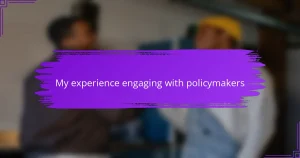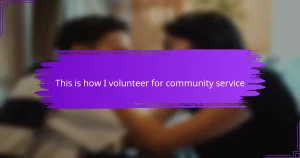Key takeaways
- Advocacy is essential for meaningful change, connecting communities and transforming values into action.
- Listening to diverse perspectives enriches advocacy efforts and empowers individuals, fostering a culture of engagement.
- Building supportive networks enhances advocacy impact, creating a collective voice that drives sustained action.
- Resilience, genuine connections, and continuous learning are crucial for effective advocacy and personal growth.
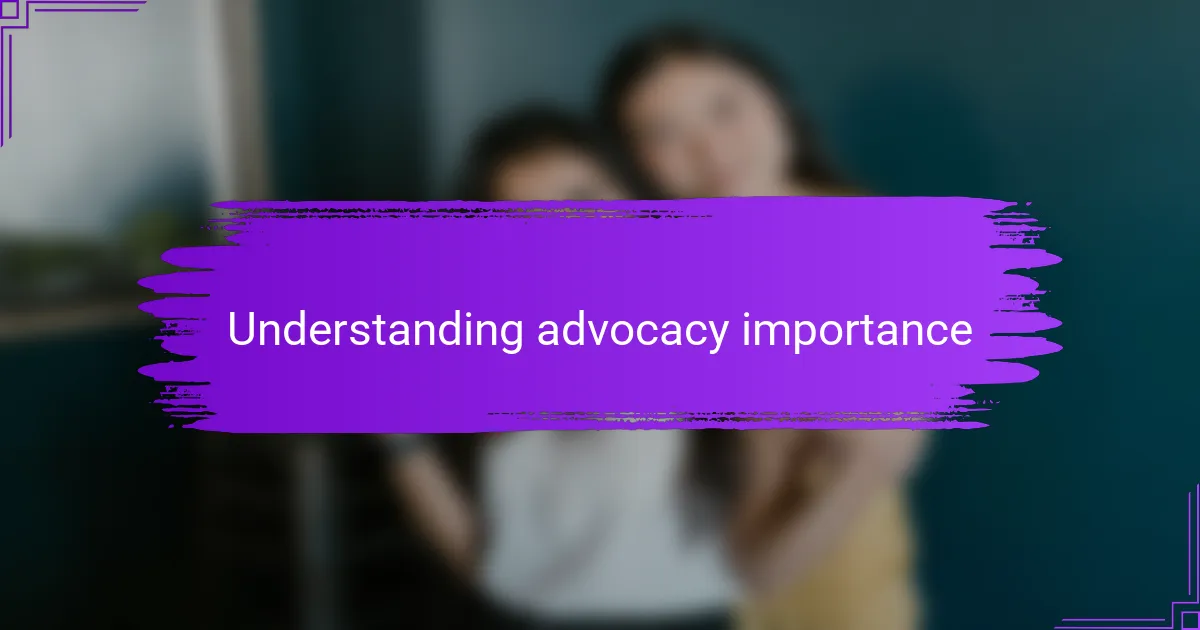
Understanding advocacy importance
Advocacy, to me, is the heartbeat of any meaningful change. I’ve seen how a single voice, when raised with conviction, can ignite a movement and bring communities together. Have you ever felt the power of standing up for something you truly believe in? That moment reveals just how vital advocacy is.
Sometimes, advocacy seems daunting, especially when the challenges appear insurmountable. Yet, from my experience supporting causes close to my heart, I know that persistence in advocacy opens doors that once seemed firmly shut. Isn’t it remarkable how consistent efforts can shift public opinion and create policies that benefit us all?
Understanding the importance of advocacy means recognizing it as more than just speaking out—it’s about embodying the values we want to see reflected in society. When I think about the Obama supporter community, advocacy isn’t optional; it’s essential. It’s the bridge connecting our shared hopes with the realities we strive to build together.
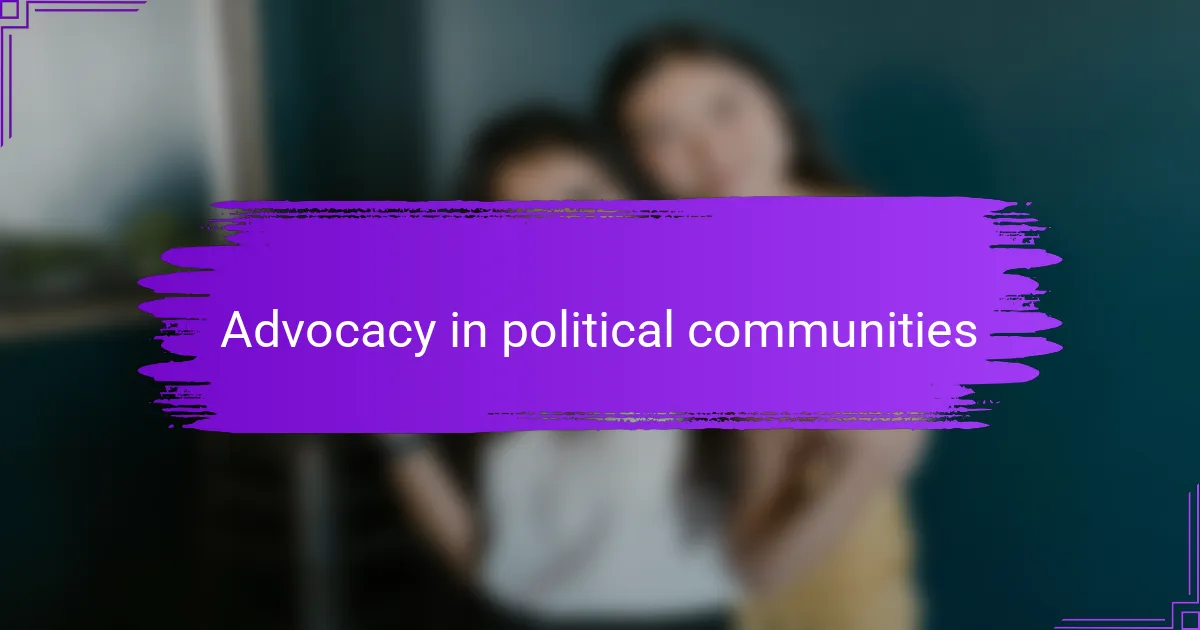
Advocacy in political communities
In political communities, advocacy feels like the pulse that keeps us connected and focused. I’ve noticed how sharing our stories and concerns creates a powerful sense of belonging, reminding me that we’re not alone in our fight for change. Have you ever experienced that moment where a collective voice suddenly feels unstoppable?
What strikes me most is how advocacy in these spaces helps transform abstract policies into personal commitments. When I talk with fellow Obama supporters, it’s clear that advocacy isn’t just about politics—it’s about standing up for the values that define who we are. Don’t you think that kind of passion is what truly drives progress?
I’ve also found that effective advocacy requires listening as much as speaking. In political communities, hearing diverse perspectives enriches our understanding and strengthens our actions. Have you ever felt that a simple conversation in a group can open your eyes and fuel your determination? That’s the power advocacy holds for me.
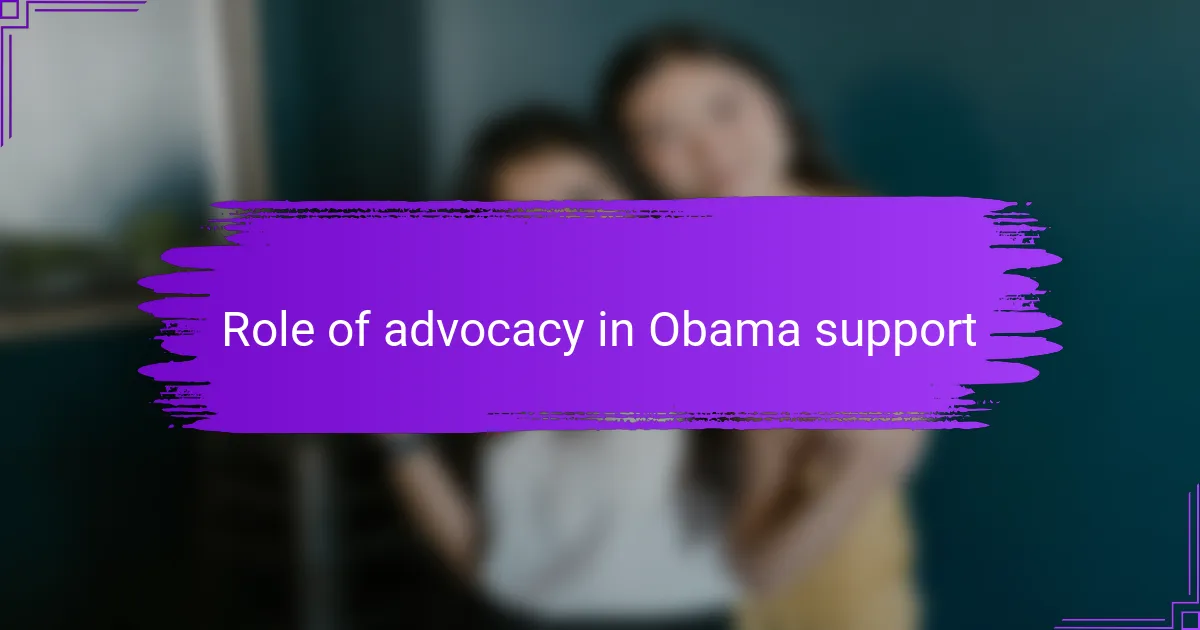
Role of advocacy in Obama support
Advocacy in the Obama support community has always felt like more than just rallying behind a candidate; it’s a commitment to championing the ideals that Obama represents. I remember attending a local meeting where passionate voices turned policy debates into heartfelt conversations about equality and justice—moments that made me realize advocacy shapes not just opinions, but identities. Have you ever found yourself moved by a story shared in such a setting, reminding you why standing together matters so deeply?
I also see advocacy here as the engine that propels our community forward during tough times. When setbacks happen, it’s those who speak up, organize, and persist that keep the flame alive for change. From my experience, it’s this unwavering advocacy that literally transforms hope into action—don’t you think that’s where true power lies?
One of the most inspiring aspects of advocacy in this space is how it fosters a culture of empowerment. Seeing friends who once felt powerless become vocal advocates taught me that advocacy doesn’t just influence politics; it changes personal narratives. Have you noticed how standing up publicly can shift your confidence and commitment in ways you didn’t expect? That’s the role advocacy plays in making Obama’s vision a living reality for us all.
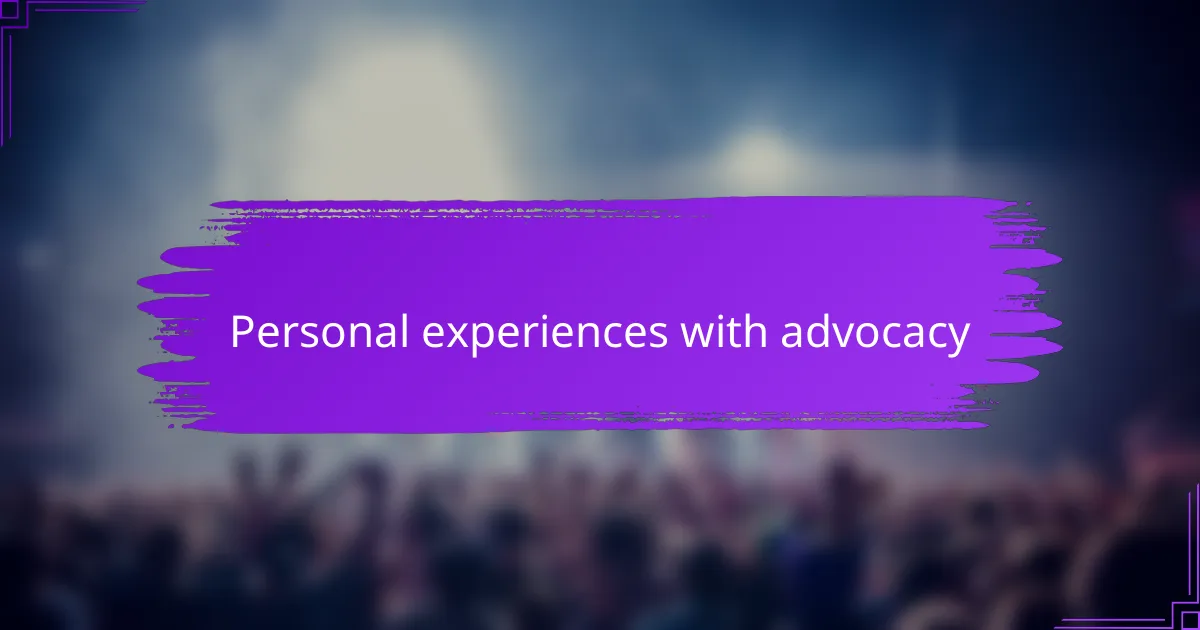
Personal experiences with advocacy
One moment I won’t forget was volunteering for a campaign event where I saw firsthand how advocacy turns hope into action. Standing shoulder to shoulder with others, each voice carried equal weight, and that collective energy was electrifying. Have you ever felt that surge of belonging that comes from fighting together for a cause?
I also recall a time when I hesitated to speak up at a community meeting, doubting if my opinion mattered. But once I did, that vulnerability transformed into confidence—I realized advocacy isn’t just about having all the answers; it’s about showing up and sharing your truth. Isn’t it amazing how these personal moments build the foundation for broader change?
Speaking from experience, advocacy isn’t always easy or comfortable. Sometimes it means facing pushback or feeling unheard. Yet, those challenges have taught me the value of persistence and the profound difference one committed person can make. Have you noticed how overcoming those hurdles makes every victory even sweeter?
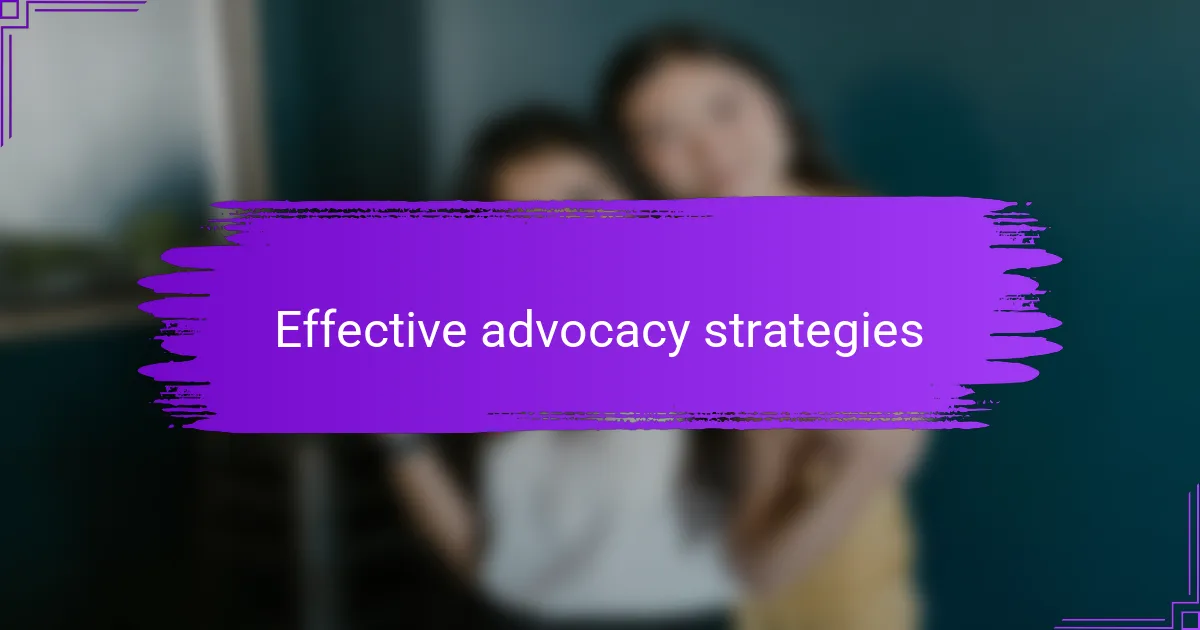
Effective advocacy strategies
Effective advocacy strategies, in my experience, often start with listening—truly hearing the stories and concerns of others before speaking up. Have you noticed how when we understand where someone is coming from, our message lands stronger and builds genuine connections? That empathy lays the groundwork for meaningful change.
Another strategy that I’ve found powerful is being clear and consistent. When I advocate, I focus on crafting messages that are simple but compelling, repeated thoughtfully across different platforms. Isn’t it fascinating how repetition, when done authentically, can turn a single idea into a movement that resonates?
Lastly, I believe that fostering collaboration multiplies advocacy’s impact. I remember joining forces with fellow supporters during a campaign where shared goals helped us overcome challenges we couldn’t face alone. Doesn’t working together, pooling our voices and resources, make every effort feel more hopeful and effective?
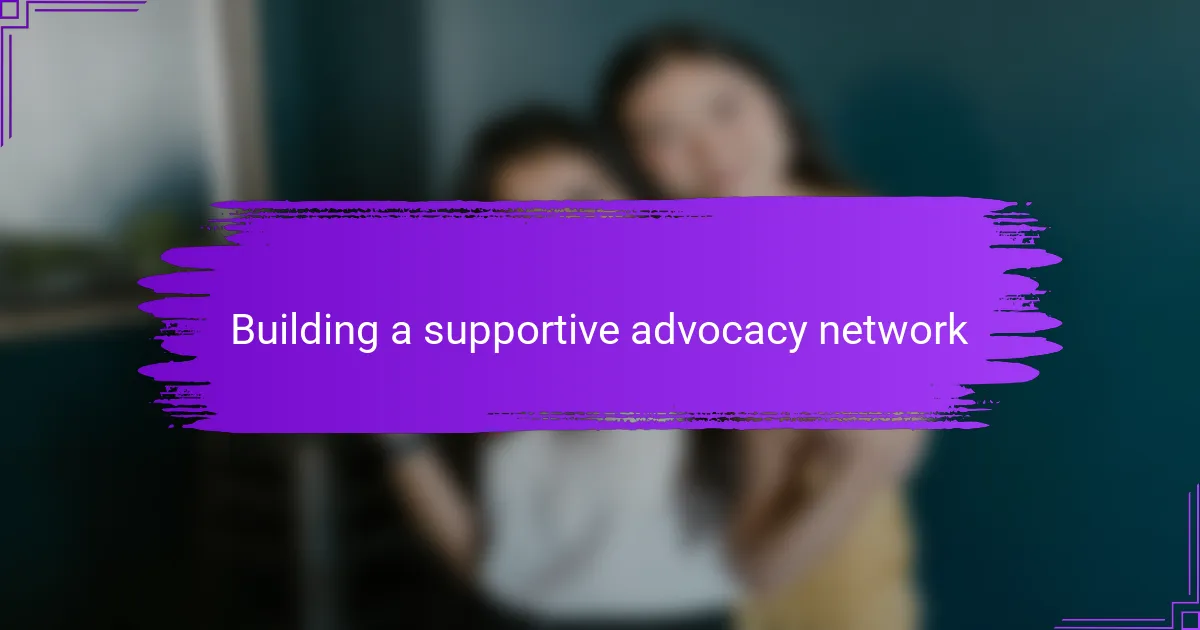
Building a supportive advocacy network
Building a supportive advocacy network, to me, means creating a space where every voice feels valued and heard. I’ve learned that when people come together with shared passion and respect, the energy becomes contagious—lifting even the quietest voices into a powerful chorus. Have you ever experienced a moment where simply knowing you’re not alone gave you the courage to speak up?
I remember attending a local gathering of fellow Obama supporters where connections formed naturally, not just over shared beliefs but through encouragement and listening. That experience showed me that advocacy isn’t just about pushing an agenda—it’s about building trust and solidarity that carry us through tough battles. Isn’t it amazing how a network built on genuine care can fuel sustained action?
Sometimes building such a network feels like planting a garden—you nurture relationships, celebrate small growths, and patiently weather setbacks. From my perspective, the strongest advocacy networks are those that embrace diversity and openness, allowing everyone to contribute their unique strengths. Don’t you think that kind of inclusive foundation makes our collective voice impossible to ignore?
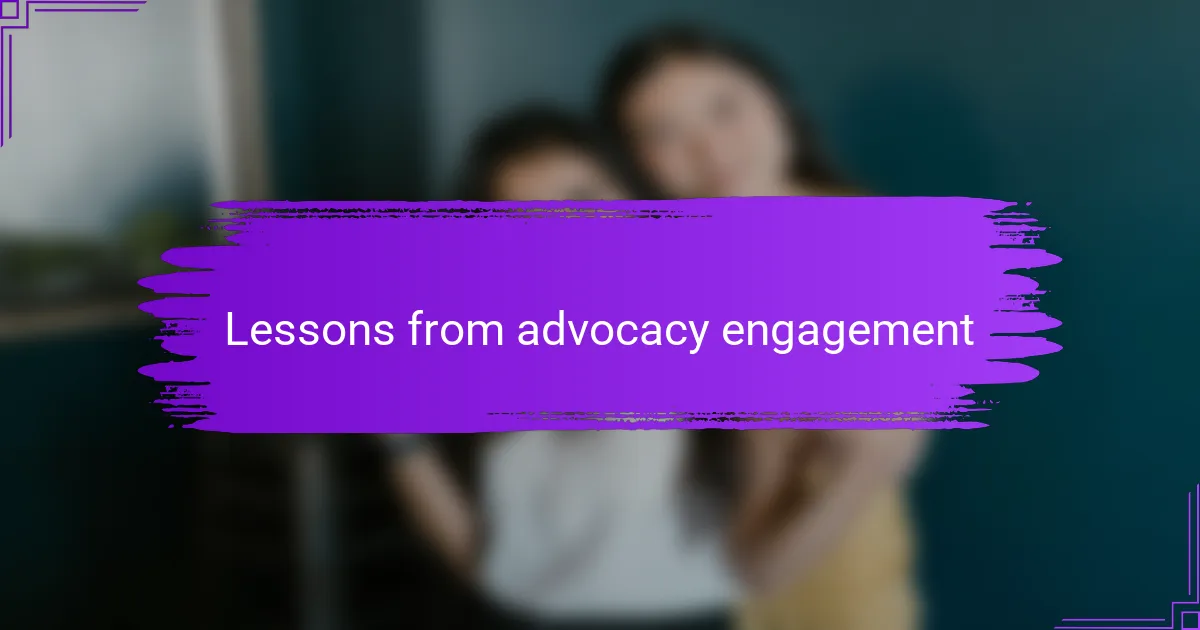
Lessons from advocacy engagement
One lesson I’ve learned from advocacy engagement is that resilience is key. Early on, I faced moments when progress felt painfully slow, and doubt crept in. Yet staying committed, even when results weren’t immediate, taught me that change often happens in quiet, steady steps—have you noticed how endurance outlasts impatience every time?
Another insight I take from my advocacy journey is the power of genuine connection. In one memorable rally, striking up conversations with strangers deepened my understanding and renewed my passion. It’s incredible how listening and sharing stories can transform a crowd into a caring community—don’t you find that personal bonds give advocacy its real strength?
Finally, I’ve realized that advocacy engagement is as much about learning as it is about leading. Each encounter brings new perspectives that challenge my assumptions and stretch my thinking. This ongoing education keeps my motivation alive and my approach flexible—have you experienced how advocacy can open your mind while igniting your heart?
